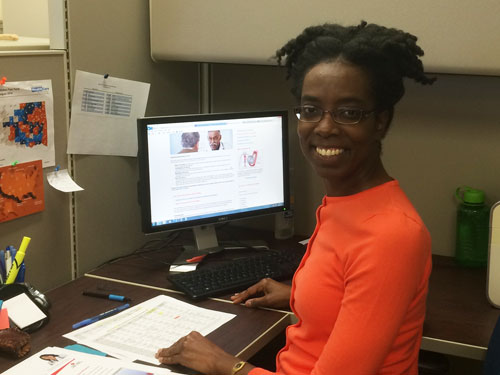Sometimes an internship provides a unique cultural encounter as well as career experience. Just ask Susan Gay, a native of the Caribbean island of Barbados and 2013 UAB alumna, who has spent five months working with Native American tribes in Oklahoma.
Gay, who received a master’s in community health education from the UAB School of Education, recently completed a substance-abuse prevention internship with the Tribal Epidemiology Center at the Oklahoma City Area Inter-Tribal Health Board, which serves the 43 federally recognized tribes in Oklahoma, Kansas, and Texas. Gay’s work was funded by a federal Strategic Prevention Framework–Tribal Incentive Grant (SPF–TIG), provided to state and tribal organizations to address substance abuse with a focus on underage drinking and prescription drug abuse in Native American communities.
Eye-Opening Experience
“Prior to this program, I didn’t have a lot of knowledge about substance abuse prevention,” says Gay, a certified health education specialist and former schoolteacher. In particular, the magnitude of substance abuse, from alcoholism to cigarette smoking, has been an eye-opener, she says. “This internship is a great opportunity to gain new skills.”
In addition to gaining practical exposure to grant writing, training, and creating informational materials, Gay has helped collect data specific to Native American youth—a key component of the grant. “Public health data on the American Indian population is not as easily available as it is for other populations,” Gay says. “Collection of such data allows for appropriate planning, implementation, and evaluation of evidence-based substance abuse prevention interventions.”
She also attended Alcoholics Anonymous meetings as an observer, which “impacted me a great deal,” she says. “I was grateful for the opportunity to hear how alcoholism has negatively affected the lives of people of all races and socioeconomic backgrounds. I was moved by the support that members receive and the effectiveness of the program in helping people achieve sobriety.”
The Past Is Present
Native Americans, along with many other minority populations, are affected by health disparities, and Gay feels that her new skills give her the ability to home in on the unique needs and challenges that tribal communities face on a daily basis. “Things like chronic diseases—which was not the focus of my internship, but is indeed an issue—prescription drug abuse, and underage drinking are prevalent among minority populations, but why is it that way?” Gay says. “Sometimes these populations don’t have equal access to basic health services.”
History also plays a role, Gay says. “In exchange for their land, Native Americans were to receive health care and education,” she explains. “Unfortunately, that hasn’t always been the case, which puts them at risk for health disparities.” Forced removals to reservations, along with other past traumas, such as the transfer of native children to faraway boarding schools, also has contributed to current substance-abuse issues, Gay says.
“In order to work with a community, you have to understand their history and the things that are relevant to them as a very traditional people,” Gay says. “Respecting their culture and values is very important. Culture helps you understand an issue and know the best way to deal with it. If you don’t have that cultural element, you’re not going to succeed in your efforts, no matter how good or commendable they are.”
Aiming for Health Equity
Gay attributes her success in her internship to her education at UAB. The knowledge and skills she gained have “taken on a different dimension,” she says. “I see how valuable they are in the real world.”
Now Gay plans to pursue a career in public health so that she can apply what she has learned in Birmingham and Oklahoma City. “I am passionate about creating awareness of health issues in order to reduce risk factors and increase protective factors,” she says. “I also wish to help achieve health equity for everyone, especially underserved populations.”